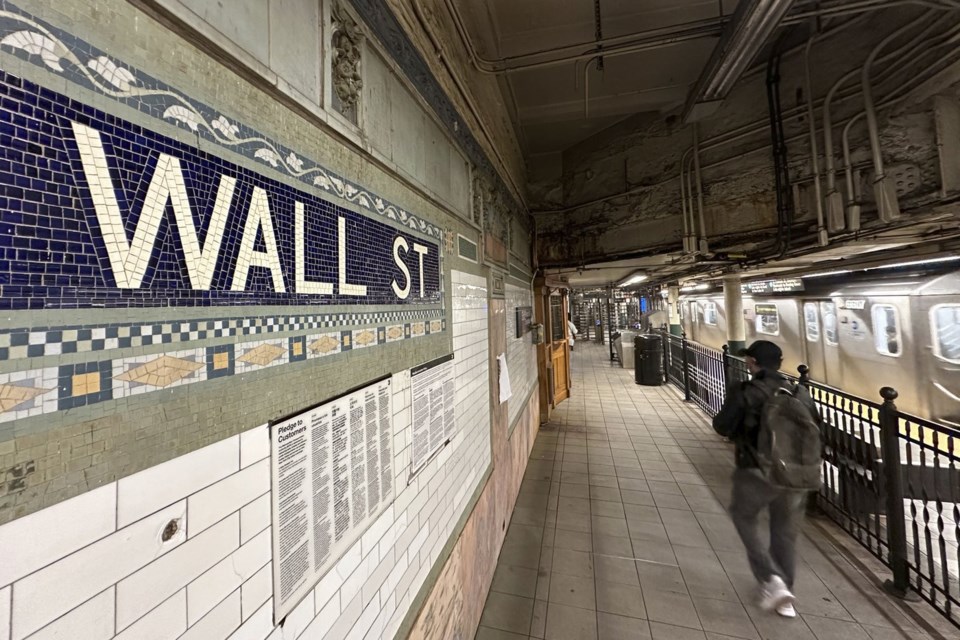NEW YORK (AP) — U.S. stocks edged back from their record highs. The S&P 500 slipped 0.2% Thursday. The Dow Jones Industrial Average fell 0.1% after likewise setting an all-time high the day before, and the Nasdaq composite fell 0.1%. Delta Air Lines fell after reporting weaker results for the summer than expected. Treasury yields swung in the bond market after a pair of disappointing reports showed inflation failed to improve as much as expected last month and more workers filed for unemployment benefits last week. Crude oil prices rose to regain some of their losses from early in the week.
THIS IS A BREAKING NEWS UPDATE. AP’s earlier story follows below.
NEW YORK (AP) — U.S. stocks are edging back from their records Thursday, while Treasury yields spin after a pair of reports showed last month than expected and last week.
The S&P 500 was 0.3% lower in afternoon trading. The Dow Jones Industrial Average was down 138 points, or 0.3%, after likewise setting an , and the Nasdaq composite was 0.1% lower, as of 2:04 p.m. Eastern time.
Stocks had stormed to records in large part on excitement about easing interest rates, now that the Federal Reserve is from their two-decade high as it widens its focus to include instead of just .
Lower interest rates ease the brakes off the economy and juice prices for investments, but the pace of further cuts will depend on if inflation continues to head down toward the Fed’s 2% target as it expects.
Thursday’s report showed inflation slowed to 2.4% in September from 2.5% in August, according to the consumer price index, but economists were expecting an even sharper slowdown to 2.3%. And after ignoring the swings for food, gasoline and other energy prices, underlying trends that economists say can be a better predictor for where inflation is heading were also a touch hotter than expected.
At the same time, a separate report showed 258,000 U.S. workers filed for unemployment benefits last week. That number is relatively low compared with history, but it was a sharper acceleration than economists expected. Hurricane Helene and a may have helped make the numbers look worse.
In the bond market, Treasury yields rose immediately after the release of the economic data, only to then swing up and down as traders tried to handicap what they would mean for the Fed.
The yield on the 10-year Treasury rose to 4.10% from 4.07% late Wednesday. The two-year yield, which more closely tracks expectations for the Fed, fell to 3.99% from 4.02% late Wednesday.
Traders are still mostly convinced the Fed will cut its main interest rate by the traditional size of a quarter of a percentage point at its next meeting, according to data from CME Group. But some are holding onto bets that it could leave the federal funds rate alone in November. That’s after many traders earlier this month were calling for a larger-than-usual cut of half a percentage point, before a set of on the economy wiped out such calls.
“Unless the jobs report that comes out on November 1st shows a dramatic drop in employment,” a traditional-sized cut of a quarter of a percentage point “might even come across as a little aggressive,” said Brian Jacobsen, chief economist at Annex Wealth Management.
On Wall Street, Delta Air Lines slipped 1.9% after reporting than analysts expected. The company said bookings for holiday travel are strong, but it’s anticipating a drop in flying around the election.
Tesla fell 0.2% as the countdown continues to a long-awaited of the company's robotaxi. CEO Elon Musk has been trying to persuade investors his company is more about artificial intelligence and robotics as it struggles to sell its core products, an aging lineup of electric vehicles.
Oil prices, meanwhile, rose to claw back their sharp giveback from earlier in the week. A barrel of Brent crude added 3.9% to $79.59. A barrel of benchmark U.S. crude gained 3.9% to $76.08.
That helped drive stocks in the energy industry higher, which kept the losses for U.S. stock indexes in check. Exxon Mobil added 1.1%, and Valero Energy rose 2.1%.
In stock markets abroad, Hong Kong’s Hang Seng jumped 3% for its latest sharp swing.
After rising on hopes for stimulus to prop up the world’s second-largest economy, Chinese stocks slumped earlier this week on . But there’s still hope that more may come.
___
AP Business Writers Yuri Kageyama and Matt Ott contributed.
Stan Choe, The Associated Press



